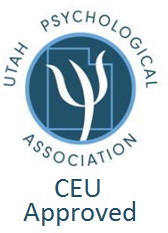- Home
- Professional Resources
- Continuing Education
![]() Utah Psychological Association
Utah Psychological Association
UPA Approved Events |
|
address: 5442 South 900 East, Suite 512, Salt Lake City, UT 84117 | phone: (801) 410-0337 | email: utahpsych@gmail.com
UPA CE events are typically held on Fridays and are fully refundable until noon on the Wednesday preceding them.
